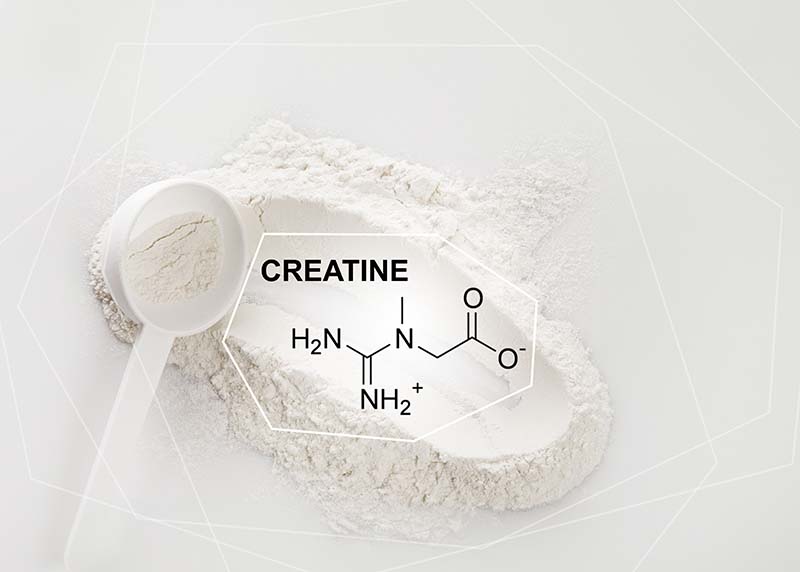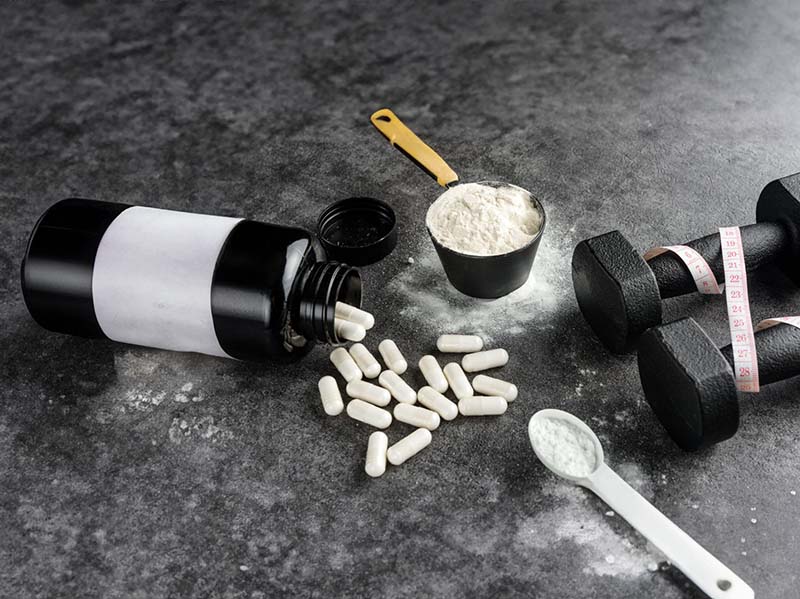If you’re involved in health and fitness at any level, you’ve likely heard about creatine. This supplement is a mainstay for many athletes and bodybuilders. If your goals include significant muscle growth and increased work capacity, incorporating creatine might be a wise choice for you too.
However, when your objectives revolve around fat loss, weight reduction, or harnessing the benefits of regular fasting, you must be cautious with supplements. While many are fine to consume during a fast, some can inhibit autophagy, thereby interrupting your fast. Does creatine break a fast?
This article will explore important details about creatine, finding out whether you should take this supplement while fasting or not.
1. What Is Creatine?
Creatine, a key player in enhancing physical performance, is a popular choice among fitness enthusiasts for its role in muscle energy production, particularly during intense training sessions. This substance, naturally present in muscle cells, is pivotal in powering high-demand activities like weightlifting.
The appeal of creatine supplements lies in their potential to augment skeletal muscle mass, bolster strength, and elevate overall exercise efficacy. Its reputation as a top-tier pre-workout supplement is well-earned.

For those practicing fasting, creatine supplements can be an invaluable ally. They provide the necessary energy for a workout, circumventing the need for pre-exercise food intake. This enables individuals to engage in strenuous exercise routines without succumbing to fatigue.
2. How Does Creatine Work During Fasting?
Creatine, a compound naturally synthesized by your liver and kidneys, originates from the protein in your diet. It plays a crucial role in energy storage within muscle cells, especially during high-intensity exercises.

While your body does produce creatine, dietary sources account for about half of your creatine levels. Foods rich in protein like meat, poultry, fish, and dairy are primary contributors. To augment your body’s creatine reserve and thereby enhance energy availability for muscles during workouts, consider adding a creatine supplement.
In comparison to other supplements, such as whey protein, creatine stands out for those who prefer exercising during fasting periods. While protein helps increase creatine levels, it also has calories and can cause a rise in insulin levels.
3. Benefits of Using Creatine
Creatine is really popular among people who work out, especially those who lift weights. Here’s why it’s such a favorite:
- Boosts Your Workout: Creatine is great for making your workouts better. It increases a substance in your muscles that helps make more energy. This means you can exercise longer and harder.
- Helps Muscles Grow Faster: Creatine is also known for helping your muscles grow. It does this by slowing down the breakdown of proteins, which are key for building muscle. Plus, research has shown that creatine reduces a certain protein that can stop muscles from growing. Since creatine is similar to amino acids, which are important for muscle building and repair, it’s really helpful.
- Speeds Up Muscle Recovery: Recovering faster after a workout is important for muscle growth and getting back to training sooner. Creatine is thought to help with this by improving how cells in muscles repair and grow.

4. Guide to Using Creatine
When considering creatine use during fasting, here are key practices to keep in mind:
- Timing: If you’re unsure about creatine affecting your fast, it’s a good idea to take it during your eating window. This approach helps you avoid any possible disruptions to your fasting routine.
- Dosage: Adhering to the advised dosage is crucial. Generally, 3-5 grams per day is the standard recommendation. This helps ensure you’re getting the right amount for benefits without overdoing it.
- Hydration: Proper hydration is essential, especially since creatine tends to increase water retention in the body. Make sure you’re drinking plenty of fluids.
- Monitoring: Observe how your body reacts when taking creatine during fasting periods. Everyone’s body reacts differently, so pay attention to any changes or effects.

5. Best Time to Take Creatine
Just like with protein shakes, it’s usually a good idea to take creatine supplements around the time you work out. But, experts are still figuring out if it’s better to take it before or after exercising. So far, studies haven’t found a big difference whether you take it before or after your workout.
The general advice is to take creatine close to when you exercise, either right before or right after. On days when you’re not working out, the timing isn’t as important. The main thing on these days is to keep your creatine levels steady. This is usually when you’re just keeping up with regular doses.

6. FAQ
6.1 What Should Not Be Taken With Creatine?
Avoid mixing creatine with caffeine and nephrotoxic drugs, as these combinations can be ineffective or harmful.
6.2 Does Creatine Break A Keto Fast?
No, creatine does not break a keto fast. It doesn’t contain calories or carbs and won’t affect ketosis.
6.3 Does Creatine Continuously Break A Fast?
No, creatine doesn’t break a traditional fast since it’s calorie-free. However, it depends on the specific rules of your fasting regimen.
7. Conclusion
In conclusion, when it comes to the question, “Does Creatine Break a Fast,” the answer is clear: pure creatine, without any added sugars or calories, does not break a fast. This makes it a viable option for those looking to maintain their workout intensity while fasting.
We’d love to hear about your experiences with creatine and fasting. Have you noticed any changes in your performance or overall health? Share your stories and feedback with us in the comments below. And for more insightful discussions and tips on health and wellness, don’t forget to check out more blogs from Biosculpture. Your journey to understanding your body better is just a click away!


